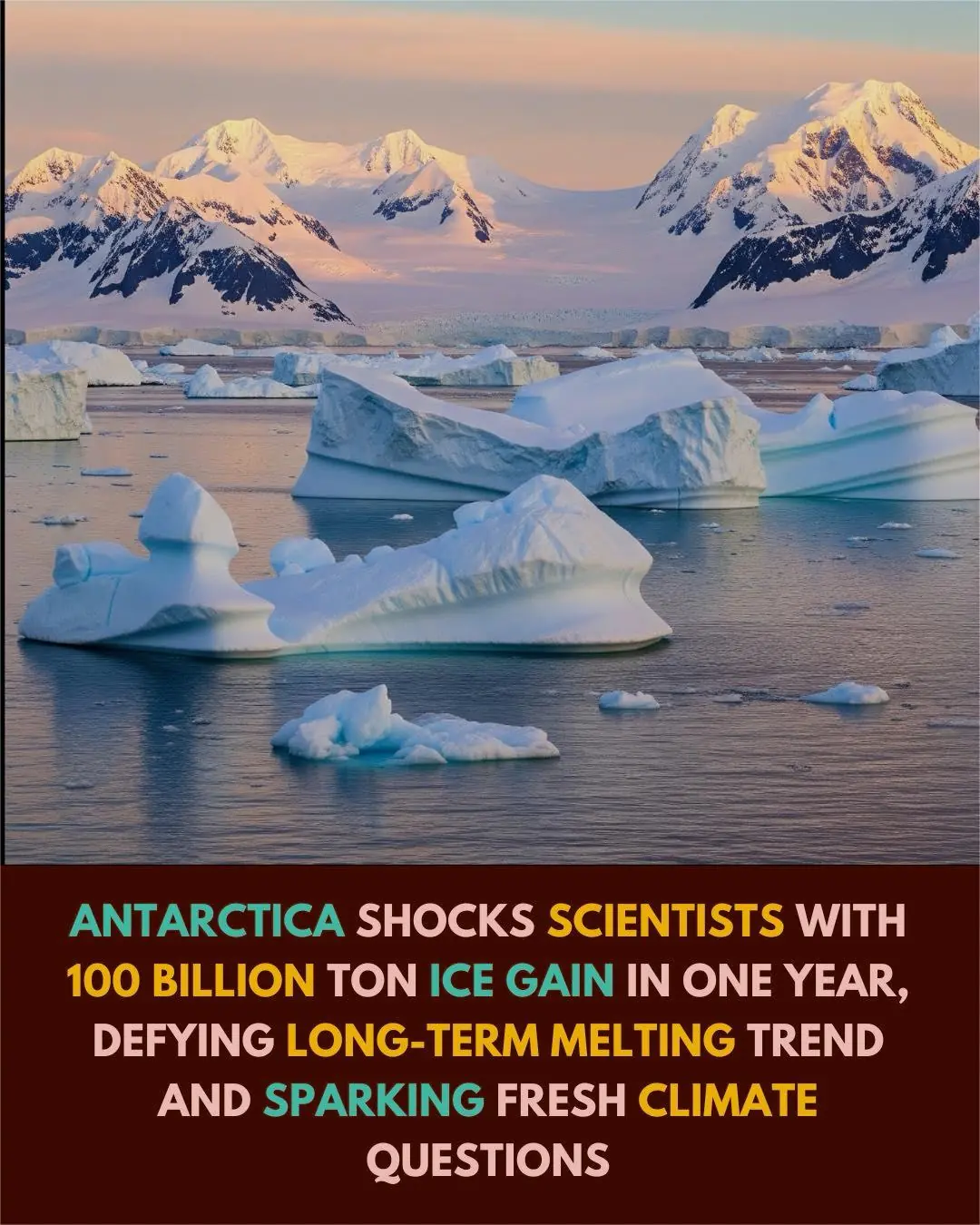
Antarctica’s Ice Surges by 100 Billion Tons — But Scientists Warn It’s Only Temporary
For decades, Antarctica has been the poster child of climate change, with melting glaciers, collapsing ice shelves, and rising seas dominating the headlines. But in a surprising twist, new research shows that the frozen continent actually gained over 100 billion tons of ice per year between 2021 and 2023 — a rare and temporary reversal that has left scientists both intrigued and cautious.
A Stunning Rebound
According to a study published in Science China Earth Sciences, satellite data and field measurements revealed that the Antarctic Ice Sheet (AIS) gained roughly 108 billion tonnes annually during this two-year period. The growth was especially strong in East Antarctica, including the Totten and Denman glacier basins, which have historically been areas of concern.
Researchers attribute this rebound to unusually heavy snowfall, fueled by climate-driven increases in atmospheric moisture, combined with colder seas and shifting wind patterns. The surge was so significant that it slightly slowed the pace of global sea level rise, reducing it by about 0.3 millimeters per year.
Why Scientists Remain Skeptical
While the numbers may sound encouraging, experts emphasize that this is not a sign of long-term recovery. “It would take about 50 years of similar snowfall to offset the ice mass Antarctica has lost over recent decades,” the researchers note.
NASA data confirms that since 2002, the continent has lost an average of 136 billion tonnes of ice per year. Even with this temporary rebound, Antarctica remains on a trajectory of long-term decline, particularly in West Antarctica and the Antarctic Peninsula, where warm ocean waters continue to erode ice shelves from below.
The Bigger Picture
This rebound highlights the complexity of Earth’s climate system: while global warming drives widespread ice loss, short-term weather extremes can temporarily mask that trend. Experts warn that overinterpreting the rebound could fuel climate misinformation.
“Antarctica’s recent growth is remarkable, but it doesn’t change the bigger story,” said one researcher. “The continent is still losing ice overall, and that remains one of the greatest drivers of sea level rise this century.”
Bottom Line
The new findings offer a rare moment of good news for Antarctica — but only in the short term. The unexpected gain of over 100 billion tons of ice shows that nature is full of surprises, yet the underlying reality of climate change remains unchanged.
In the battle against global warming, Antarctica’s brief ice recovery is less a turning point than a reminder: temporary fluctuations cannot outweigh the long-term trend of loss.
News in the same category


Spanish Man Jailed After Faking 20 Heart Attacks to Avoid Restaurant Bills

Brain-to-Brain Connectivity? Separating Fact from Fiction in Electromagnetic Theories

Two-Headed Sea Turtle Hatchling Discovered on Hilton Head Island

Rare White Dolphin Spotted off Virginia’s Chincoteague Island

Rowan Atkinson: From Oxford Scholar to Global Comedy Icon

Minneapolis ICU nurse faces horror as school shooting victims arrive

A Heartwarming Moment: Toddler Meets His Garbage Truck Heroes

Dr. Sanduk Ruit: The “Miracle Doctor” Who Restored Sight to the World’s Poorest

Bhutan: The World’s Only Carbon-Negative Nation

Norway Leads the Way in Seaweed Farming for Climate and Energy Solutions

Rob Kenney: The YouTube “Dad” Who Stepped In When Millions Needed Guidance

A Simple Paint Job Could Save Thousands of Birds From Wind Turbine Collisions

Bear attack survivor wrote chilling final note to loved ones after picking up pieces of his own flesh

From Bee Stings to Breakthroughs: How Venom Could Fight Breast Cancer

British Man Claims He Hasn’t Slept in Nearly Two Years, Even Under Powerful Anaesthetic

Florida Man in Batman Pajamas Stops Burglary, Helps Police Arrest Suspect

Keanu Reeves Turns Emergency Landing into a Heartwarming Road Trip
News Post

Discover the Wonders of Tamarind: Flavor and Health in Every Pod

Olive Oil with Lemon: A Simple Yet Powerful Combination

Garlic: A Powerful Ally in Natural Health

Jarabe Natural para Controlar la Glucosa: Receta y Beneficios

Spearmint and Rosemary: A Powerful Natural Combination for Joint Health

Discover the Magic Plant to Cleanse the Liver and Reduce Intestinal Inflammation

The Best Green Juice for Weight Loss – It Will Leave You Flat! Don’t Drink Too Much or Your Pants Might Fall Off..

6 MEDICINAL HERBS THAT IMPROVE YOUR HEALTH 👇

Uchuva: Golden Fruit that Protects Your Vision, Its Effect Comes from Its Form… See More

Symptoms of High Cholesterol: What to Watch For

Discover the Magic of Red Onions for Varicose Veins

Mixing Cloves with Cinnamon Can Trigger an Irreversible Body Reaction! 🌿🔥

Drink Ginger with Cloves Every Morning – Here’s What Will Happen to Your Body After 7 Days! 🌿🔥

Make Bread in 10 Minutes in a Fry Pan | No Eggs, No Yeast 🍞🔥

Lemon + Watermelon Did This — Doctor Couldn’t Believe It

Unlock the Secret to Vitality: This Nutrient-Packed Smoothie Will Transform Your Day

From Steel Tycoon to Canine Savior: The Selfless Journey of Wang Yan

Spanish Man Jailed After Faking 20 Heart Attacks to Avoid Restaurant Bills

Half Male, Half Female: The Rare Wonder of a Bilateral Gynandromorph Butterfly

